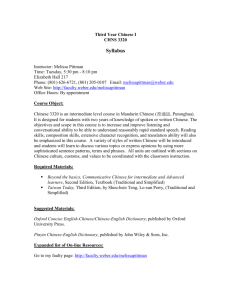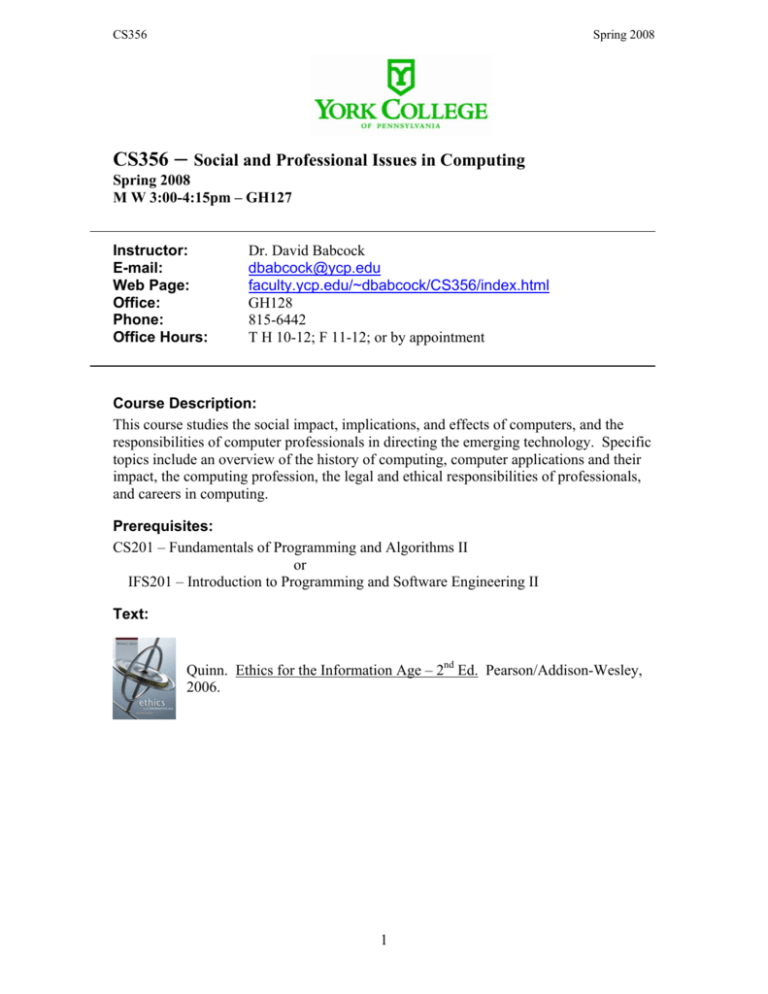
CS356
CS356
Spring 2008
– Social and Professional Issues in Computing
Spring 2008
M W 3:00-4:15pm – GH127
Instructor:
E-mail:
Web Page:
Office:
Phone:
Office Hours:
Dr. David Babcock
dbabcock@ycp.edu
faculty.ycp.edu/~dbabcock/CS356/index.html
GH128
815-6442
T H 10-12; F 11-12; or by appointment
Course Description:
This course studies the social impact, implications, and effects of computers, and the
responsibilities of computer professionals in directing the emerging technology. Specific
topics include an overview of the history of computing, computer applications and their
impact, the computing profession, the legal and ethical responsibilities of professionals,
and careers in computing.
Prerequisites:
CS201 – Fundamentals of Programming and Algorithms II
or
IFS201 – Introduction to Programming and Software Engineering II
Text:
Quinn. Ethics for the Information Age – 2nd Ed. Pearson/Addison-Wesley,
2006.
1
CS356
Spring 2008
Course Objectives
In this course students will learn to:
• identify the basic concepts of ethics, morality, and logical arguments/fallacies
• understand the responsibilities of computer professionals as defined by the
Software Engineering Code of Ethics and Professional Practice
• formulate viewpoints concerning the current legal and ethical status of
intellectual property rights – specifically trade secrets, trademarks, copyrights,
patents, and licensing – as they relate to computer software
• present justified rationale on privacy, security, and censorship policies in the
realm of computer networks and the Internet
• develop arguments regarding the social implications and inequities arising from
the expansion of technology in the global community
Grading Policy:
Grades will be based on a combination of weekly quizzes, 3 exams, and 2 research
papers.
•
•
•
•
Quizzes – 15%
3 exams – 45% (15% each)
Midterm report – 20%
Final report – 20%
Quizzes will be given at the beginning of class and will be based on the assigned reading.
No make-up quizzes will be given but you will be allowed to drop the lowest quiz grade.
Exams will consist of an in-class discussion period and a subsequent write-up
period. They will be evaluated based on an understanding of the material in the text
along with your independent critique of the topic.
The intent of the midterm and final papers is to provide an opportunity to investigate in
greater depth particular issues discussed in class. Further details will be provided later in
the semester.
Grading Scale
Range Grade
100-90
89-87
86-80
79-77
76-70
69-60
59-0
4
3.5
3
2.5
2
1
0
2
CS356
Spring 2008
Attendance Policy:
Students are expected to attend all scheduled classes and read the appropriate text
material prior to class. If a student must miss a class, it is his responsibility to notify the
professor prior to class. Students are responsible for all material covered in class.
York College Academic Integrity:
Students are expected to maintain their integrity at all times. Although cooperative
learning is strongly encouraged, all work submitted for grading must be a reflection of
your knowledge of the subject. Academic dishonesty includes, but is not limited to,
plagiarism; cheating; fabrication of results, information, or references; submission of
another’s work as one’s own; or tampering with the work of another. Cheating on
assignments and/or examinations will result in a “0” at minimum for all involved work
and possible removal from the course at the discretion of the professor. A written report
of the circumstances and disciplinary action will be provided to the student along with a
copy forwarded to the Dean of Academic Affairs which may result in suspension from
the college for repeat offenses. Students have the right to challenge any such actions
through the normal appeals procedure.
York College Communication Standards:
York College recognizes the importance of effective communication in all disciplines and
careers. Therefore, students are expected to competently analyze, synthesize, organize,
and articulate course material in papers, examinations and presentations. In addition,
students should know and use communications skills current to their field of study,
recognize the need for revision as part of their writing process, and employ standard
conventions of English usage in both writing and speaking. Students may be asked to
further revise assignments that do not demonstrate effective use of these communication
skills.
Disclaimer:
This syllabus is subject to change by the instructor.
3
CS356
Spring 2008
Tentative Course Outline
Week
Topic
Jan 23-25
Introduction and Ethical Theories
Relativism, Kantianism
Utilitarianism, Social Contract, Virtue Ethics
Professional Ethics
SECEPP
Whistleblowing
Software Reliability and Engineering Responsibilities
Software Warranties
UTICA
Licensing and EULA’s
Jan 28-Feb 1
Feb 4-8
Feb 11-15
Feb 18-22
Feb 25-29
Mar 3-7
Mar 10-14
Intellectual Property
Trade Secrets, Trademarks
Patents, Copyrights
Fair-Use, DMCA
Peer-to-Peer Networks
Copyleft, Open-Source, Creative Commons Licensing
Exam II – Mar. 17,19 (Ch. 4)
No class Mar 24 – Spring Break
Midterm Paper/Presentations – Mar 26
Mar 31-Apr 4
Privacy, Security, and Censorship
Public Information and Records
USA PATRIOT Act
Identity Theft, Encryption
E-mail and SPAM
Censorship, Age Verification
Pornography, Freedom of Expression
Social Aspects of Technology
“Winner-Take-All” Society
Globalization, Digital Divide
Apr 14-18
Apr 21-25
Apr 28-May 2
May 5-9
May 12-16
Ch. 2.1-2.5
Ch.2.6-2.10,9.4.2
Ch. 9.1-9.4
Ch. 9.6
Ch. 7.1-7.7
Ch. 7.8
Exam I – Feb. 18,20 (Ch. 2,7,9)
No classes – Winter Break
Mar 17-21
Mar 24-28
Apr 7-11
Reading
Assignment
Exam III – Apr. 28,30 (Ch. 3,5,8)
Final Paper/Presentations – May 5,7
4
Ch. 4.1-4.3
Ch. 4.7
Ch. 4.4-4.5
Ch. 4.6
Ch. 4.8-4.10
Ch. 5.1-5.5.6
Ch. 5.7-5.8
Ch. 5.10-5.11
Ch. 3.1-3.3
Ch. 3.4-3.6
Ch. 3.7-3.9
Ch. 8.6
Ch. 8.4-8.5



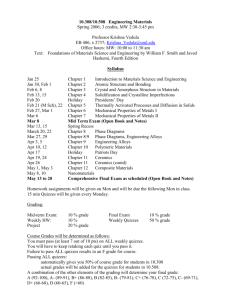
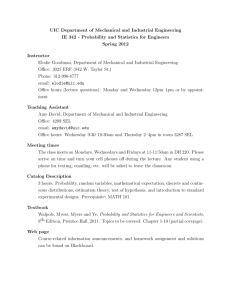
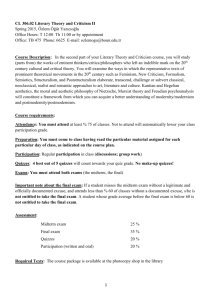

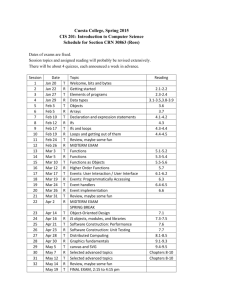


![BIOS430 Evolution, Spring Semester 2016 Syllabus [v1.0]](http://s3.studylib.net/store/data/008212911_1-eda4846995a3f3a1f17c130a72ee789b-300x300.png)
